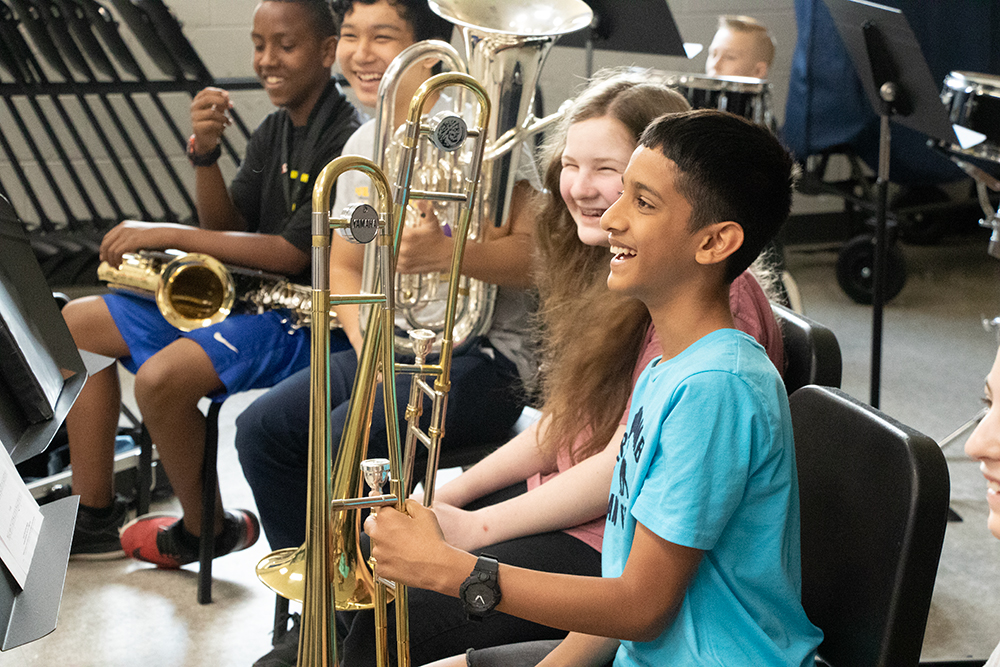Full Disclosure: I was “that kid” in the back, planting giggle-worthy ideas in other kids’ heads. It’s the blessing/curse of being a low brass player. I was a decent young player, knew my parts, and often was bored when the conductor had to work with the (x) section AGAIN. My musical maturity clashed with my personal maturity on a daily basis (still does). Fortunately, I had a good sense of humor, a modicum of discretion, and VERY patient teachers. I think they knew and appreciated the fact that I knew my parts, and helped my section, but wished I was a bit less disruptive – I mean “helpful.”
I’ve since had the good fortune of being on the other side of things, getting a taste of my own medicine. It’s easy to find ways to call out students in a way that may embarrass them or put them on their heels. The problem with that strategy though is that it can kill the vibe in the room and make a case for “that conductor dude is a total jerk-face” thinking.
So what’s to be done?
Recruit them!
If you can keep your cool and remember that it takes all the ingredients to make the musical soup, you can work to enlist the inactive players. Make them partners and supporters of their peers. It takes more planning initially but once these strategies are familiar to the group, they can become second nature and can reinforce the notion that “we’re all in this together.” Here are some ideas:
- Active listening (analytical and artistic). I like to use a Like/Wish/Wonder approach. After the section in question plays through a rough patch, select a student to list something they LIKE about what they heard. Then ask another student to list something they WISH they had heard and finally ask a third if they WONDER how the students might improve. It’s a very positive framework for feedback and if the Like/Wish/Wonder students are selected at random, everyone needs to be dialed in.
- Silent practice (finger/stick coordination, rhythm, ear training, wind pattern, etc.). This one is pretty obvious and fairly common. I use it all the time and it works great.
- Have the rest of the group sing their parts (on pitch) while you are working things out with the section in question. This helps strengthen the ears of the “singers” and can help them understand how their part fits with the rest of the group since they are not focused on “instrument operation,” just musicking.
The last two ideas are variations on strategy number 4. - Have the group set up a groove for them to play over. This can be with mouth or body percussion, will help with the overall rhythm and ensemble of the group.
- Have the group sing or play a drone for them to play over. This can be sung or played, reinforcing pitch and tonal centering.
Ultimately, while I was undoubtedly disruptive at times in the back row, my heart was in the right place. I loved band, my directors, and my fellow bandos and I genuinely wanted us to sound good. That’s most of your students. They need a place to direct that energy. Hopefully, these strategies can help you keep them more focused on music-making than nit-wittery. Even the ones in the back row.
About the Author
LANCE LADUKE is internationally known as an educator, performer and creator. He teaches at Carnegie Mellon University as Artist Lecturer in Euphonium, Freshman Advisor and Coordinator of Special and Creative Projects. Lance teaches business, marketing and communications as part of the CMU Music Entrepreneurship Program, coaches and mentors a variety of chamber ensembles and is also Adjunct Professor of Euphonium at Duquesne University. Lance was a member of Boston Brass and the US Air Force Band in Washington DC, has performed with the Philadelphia Orchestra and currently plays with the River City Brass. He has taught and/or given master classes at some of the world’s finest conservatories, including Juilliard, the Royal Academy of Music in London and the Hong Kong Academy for Performing Arts. Lance co-wrote and produced “Band Blast Off,” a highly successful band recruiting DVD and maintains an active speaking career, sharing his thoughts on practice, leadership, and self-development. His wildly successful book, “Music Practice Coach, Five Workouts to Get the Most Out of Your Practice Time!” is available as a free PDF at lanceladuke.com. Lance is an Educational Ambassador for Jupiter Band Instruments.
The content of this Blog article or Banded Story is the intellectual property of the author(s) and cannot be duplicated without the permission of KHS America and/or the author(s). Standard copyright rules apply.



 We look forward to the evolution of this exciting program, and welcome feedback on how we can further enhance the work that you do in music education.
We are excited to offer your program the opportunity to join the KHS America Academic Alliance today.
We look forward to the evolution of this exciting program, and welcome feedback on how we can further enhance the work that you do in music education.
We are excited to offer your program the opportunity to join the KHS America Academic Alliance today.